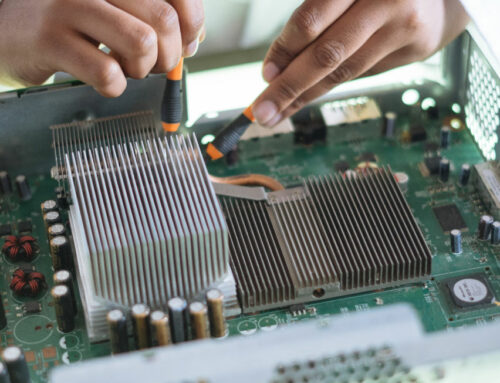When looking for enterprise networking hardware, there is no shortage of vendors available. To help you make an educated decision, we compared three of the leading enterprise networking vendors; Cisco, Juniper, and HPE.
Cisco
Of the three vendors we compared, Cisco is by far the largest of them. Cisco is a leader in market share and has been the biggest player in enterprise networking since they started in 1984. As of 2017, they held 60% of the routing and switching market.
Because of their size and experience, they offer nearly any product that you would need for your enterprise network. All these products work well together but they may not play so nicely with products from other vendors. While some of their competitors may be able to address some networking challenges better than Cisco, none can compete with the breadth of their product line.
Cisco was the most expensive vendor we reviewed. In an interview with TechTarget, they quoted a price of nearly $100,000 more than the other vendors for the same equipment.
From a support perspective, Cisco has caught some flak for not offering support for out of warranty equipment or lapsed service contracts. However, another benefit of their size is the
around-the-clock technical support services they offer, either online and over the phone to all customers. Cisco also has an extensive support community, with more than 840,000 members and over 880,000 discussions.
Praise for Cisco:
- Forrester rated Cisco as a strong performer in its 2018 Forrester Wave™ report.
- Cisco was named by Gartner as a Leader in the 2018 Magic Quadrant to Data Center Networking. Leaders rate highly in terms of both ability to execute and completeness of vision.
- According to Gartner Peer Insights, Cisco earned the overall rating 4.5 based on 190 reviews. Product capabilities were rated 4.6.
Juniper Networks
Compared to Cisco and HPE, Juniper is the young pup in the game, however since they were founded in 1996, they have been taking market share from Cisco. Juniper Networks has maintained steady annual growth in a competitive market.
Juniper Networks’ data center solutions, in particular, are on par with the competition. They offer integrated and well-made solutions and integrate better with other third-party vendors than Cisco. Their software also leverages an open framework that integrates smoothly with other areas of the network. Juniper jumped on mesh networking and other next-generation technology, which indicates that they are perhaps more agile than their older, staid competition.
Juniper Networks offers competitive pricing and their website has tools that assist in product selection and comparison.
Juniper Networks offers self-service support tools, downloads and documentation. You can also report a vulnerability and search for reported problems. You can contact support by phone or submit a web service request. Their response times are clearly outlined on their support page by priority and escalation policy.
Praise for Juniper Networks:
- Juniper Networks was named by Gartner as a Leader in the 2018 Magic Quadrant to Data Center Networking, rating them highly in both ability to execute and completeness of vision.
- The 2018 Forrester Wave™ report ranks Juniper Networks as a leader in Data Center Hardware Platforms for Software-Defined Networking.
- According to Gartner Peer Insights, Juniper Networks earned the overall rating 4.6 based on 155 reviews. Product capabilities were rated 4.7.
Hewlett Packard Enterprise (HPE)/Aruba
HPE acquired Aruba in 2015 and Aruba has since become the wireless arm of HPE. Aruba brought with it a large network share, 20% of global wireless revenue.
In addition to the wireless market, HPE/Aruba announced its entry into the core switching market in 2017 and released new hardware in 2018. This hardware works with the ArubaOS-CX operating system, created as a complete solution offering visibility and management for enterprise networks and the move toward IoT. HPE also maintains its ProCurve switch line, which doesn’t offer all the bells and whistles of rival Cisco’s switches, are competitive both in terms of features and price.
You can compare products and models on the HPE website, and they offer a shop with clearly labeled pricing so you can figure out what models fit your needs and budget. If you’re already an enterprise customer, you will have access to their HPE Elite shop.
HPE has a support community where you can discuss issues with experts and peers to get advice, discuss issues and find solutions. Their support page allows you to check your product warranty, manage open cases, search a knowledge base of documentation and more. They have a support chat function as well as global support numbers by country, many of which offer 24×7 support.
Praise for HPE/Aruba:
- HPE was named a Niche Player by Gartner in the 2018 Magic Quadrant to Data Center Networking 2018.
- According to Gartner Peer Insights, HPE earned the overall rating 4.4 based on 61 reviews. Product capabilities were rated 4.5.
Pricing Comparison:
Approximate cost of a core switch with the components to support 96 10 Gigabit Ethernet ports in a chassis.
Cisco – $240,000
6509-E switch chassis, Sup2T 9 Slots Bundle ($38,000), Six 6816 Line Cards ($32,000) and dual power supplies ($5,000).
HP – $146,994
HP 10504 switch chassis ($6,000), four HP 10504 960 Gbps Type D Fabric Modules ($8,999), HP 100500 Main Processing Unit ($9,000), dual HP 10500 2500 AC power supplies ($2,000), two HP 10500 48-port 10 GbE SFP+ SF Modules ($45,999).
Juniper – $145,000
EX8216 redundant chassis with 96 line-rate 10 GbE ports. Or a 5:1 oversubscribed 10 Gigabit Ethernet switch ($75,000).
Source: TechTarget https://searchnetworking.techtarget.com/feature/Campus-core-switch-comparison-How-Cisco-HP-Juniper-differentiate-their-switches
If you still can’t decide on enterprise networking hardware, contact us and a member of our expert staff will help.




